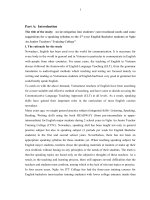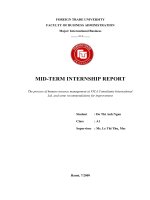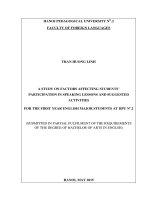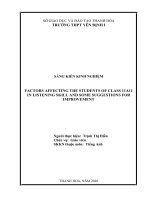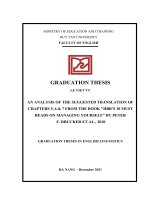The factors affecting the speaking ability and some recommendations for improving it to english majored huflit senior graduation paper
Bạn đang xem bản rút gọn của tài liệu. Xem và tải ngay bản đầy đủ của tài liệu tại đây (613.96 KB, 36 trang )
Department of Foreign Languages
HUFLIT UNIVERSITY
ASSIGNMENT COVER SHEET
Full Name: Le Thi Thu Thuy
Student ID Number: 15DH710468
Unit Code:
Unit Code: Graduation paper
Assignment Title:
FACTORS AFFECTING ENGLISH MAJOR SENIORS’ SPEAKING ABILITY AT
HUFLIT UNIVERSITY
Name of Lecturer:
Place of Lectures:
Mr. Dong Trinh Duc
155 Su Van Hanh (nd), Ward 13, District 10, Ho
Chi Minh City
Date Submitted:
Student Email Address:
STUDENT DECLARATION
I declare that this assignment is original and has not been submitted for assessment
elsewhere.
I declare that this assignment is my own work and does not involve plagiarism or
collusion.
I give my consent for the electronic version to be examined by relevant plagiarism
software programs.
I have made a photocopy or electronic copy of my assignment, which I can produce if
the original is lost for any reason.
SIGNED: _______________________________________
Le Thi Thu Thuy
DATED: 20/06/2019
Page 1
INSTRUCTOR’S ASSESSMENT
Abstract
Introduction
Literature Review
Method
Result
Discussion
References
Appendix
Le Thi Thu Thuy
Page 2
ACKNOWLEDGEMENT
This study would never have been completed if it had not received the support and
help of many people.
Firstly, I want to express my sincere thanks to Mr. Dong Trinh Duc who willingly
accepted to instruct me during 5 months of this graduation thesis project. His warm
encouragement, meticulous guidance and excellent assistance contributed a lot to the
completion of this thesis. His willingness to give abundant ideas and suggestions as well
as correct my research has been very much appreciated.
Secondly, I greatly appreciate the support of Huflit English major students who
willingly took part in and gave their precious time and effort to complete the survey. If
they had not agreed to participate, the project would have never seen the full fruition.
Lastly, I am very thankful to have my beloved family and friends who always
encouraged me and gave precious advices which helped me a lot to finish my research. I
am particularly grateful for the encouragement given by my mother who gave me the
moral support during this tough time. Special thanks should be given to my friends who
gave me consolation and positive encouragement when I had difficulties in doing the
research. They wholeheartedly assisted me to complete the survey without any
impediment.
Le Thi Thu Thuy
Page 3
TABLE OF CONTENTS
ABSTRACT ........................................................................................ 6
I. INTRODUCTION .......................................................................... 7-9
1. Background ............................................................................ 7-8
2. Literature Review ................................................................... 8
3. Scopes .................................................................................... 8
4. Research Objective ................................................................. 8-9
5. Research Organization ............................................................ 9
II. LITERATURE REVIEW ............................................................. 10-13
1. Definition of Speaking .......................................................... 10
2. Important of Speaking ........................................................... 10-11
3. Factors Affecting Speaking Skill ........................................... 11-13
III. RESEARCH METHODOLOGY................................................ 14-15
1. Description of the Subjects .................................................... 14
2. Procedures of Data Collection ............................................... 14-15
3. Data Analysis and Interpretation ........................................... 15
4. Statistical Treatment.............................................................. 15
IV. RESULT ....................................................................................... 16-24
1. Result of questionnaires ........................................................ 16-23
2. Result of Interview Questions ............................................... 23-24
V. DISCUSSION AND RECOMMENDATION .............................. 25-27
1. Purpose of Study .................................................................... 25
2. Finding and Explanation ........................................................ 25
3. Limitations ............................................................................. 26
4. Recommendation ................................................................... 26-27
Le Thi Thu Thuy
Page 4
REFERENCES ................................................................................... 29-30
APPENDIX A: Survey question (English version) ........................... 31-32
APPENDIX B: Survey question (Vietnamese version) .................... 33-34
APPENDIX C: Interview question English version ......................... 35
APPENDIX D: Interview question Vietnamese version .................. 36
Le Thi Thu Thuy
Page 5
ABSTRACT
Having a good study method has long been a hot issue for any students. This can
be determined by study habits that people use every day. In reality, many language
learners find it difficult to express themselves in spoken language in the target language
due to their own problems and abilities while speaking English. The purpose of this study
is to investigate the speaking problems of the Huflit (Ho Chi Minh university of Foreign
Languages and Information Technology) students whose major is in English and the
factors affecting their speaking English. To carry out this survey, 100 English major
juniors at Huflit were invited to do the questionnaire of 5 questions relating to their
problems they have while speaking English and the root of these problems. Some of them
were asked to participate answering an interview with 2 questions given by the writer.
Based on the research findings, some recommendations were made to help students
improve their speaking ability.
Le Thi Thu Thuy
Page 6
CHAPTER I: INTRODUCTION
1. Background:
Language is the primary communicative tool of human being. Through this tool
people can share their ideas and thoughts with others. Some people even say that
language is what separating us from animals. There are thousands of languages in this
world. Some are spoken by millions of people like English, Chinese,
Spanish,…(Wikipedia,[p1], 2019); however, according to a research of Quart in 2006,
some of them are just spoken by only less than 100 people such as Bong’om, Boni,
Yakunte,…. Thanks to the influence of British Empire during the 18th century industrial
revolution, English became widespread in the first place, at which people used it as a tool
to communicate and started doing trade with places like Africa, Asian, etc. as well as
colonizing and ruling colonial countries around the globe. However, English at this time
was mainly used in administration and business dealings (ESL stories, 2014).
Since then, English gradually has become an indispensability for human being and
an elitist language spoken by those who are educated in literature, philosophy, poetry, etc.
With the importance of English, it has been taught in most of schools worldwide from
primary school to university. When a student starts learning English, speaking skill seems
to be the most important one of all four skills (listening, speaking, writing, and reading)
because those who know a language are usually referred to as speakers of that language
(Ur, 1996). Meanwhile, Brown G. and Yuly G. (1983) stated that spoken language
production was often considered one of the most difficult aspects of language learning
due to its various problems for different students. This makes the English communicative
skill of students during and after their learning process become poor and hard to meet
requirements of recruiters/ employers after graduating.
Le Thi Thu Thuy
Page 7
With the above points, the writer conducted this study on Huflit English major
seniors to find out their limitations in speaking English with the hope of helping speaking
ability of the writer herself and other students become more and more better.
2. Literature Review:
People cannot deny the fact that English plays an important role nowadays. One of
English language skill that must be mastered is the ability to speak. Speaking is an
interactive process of constructing meaning that involves producing, receiving and
processing information. Its form and meaning are dependent on the context they occur,
including participants and their collective experiences, the physical environment, and the
purposes for speaking (Brown 1994, Burns and Joyce 1997). Speaking is a skill by which
you are judged while first impression are being formed (Hedge 2000: 206). When we talk
about speaking, we do not mean just saying the words through mouth. It means conveying
the messages you want to express to the listeners. Therefore, the most difficult skills
language learners face in language learning is speaking skill. It is believed that speaking
is the most important of the four language skills. Bueno, Madrid, & Mclaren, 2006 stated
that many learners had spent so many years studying English language but could not
speak it appropriately and understandably.
3. Scopes:
The focus of this paper is on the speaking English problems of seniors whose
major is in English at Ho Chi Minh City University of Foreign Languages and
Information Technology (HUFLIT).
4. Research Objective
The purpose of this study was to find out the problems making Huflit DFL seniors
cannot speak English fluently, to help them see where the root of the problems is, and to
find some solutions to help students conquer difficulties of speaking this language. To
Le Thi Thu Thuy
Page 8
find the answers for the above problems, two research questions are given to service for
this research paper:
1. What are problems Huflit English major seniors have in English speaking?
2. What do Huflit English major seniors feel when they spend English speaking
lessons in class?
5. Research Organization:
This paper is divided into five sections. The first one gives a brief overview of
Speaking English habits among university students, and the second one comprises
analyses of aspects making students cannot speak English fluently. The third one is of
description of how the research is carried out. The research findings and discussion will
be displayed in section 4, and the final section includes some conclusions and
recommendations given out to help students to overcome difficulties while speaking
English.
Le Thi Thu Thuy
Page 9
CHAPTER II: REVIEW OF LITERATURE
This literature review discusses difficulties making Huflit DFL senior confused
when they are speaking English including the definition of speaking and the importance
of it.
1. Definition of speaking
There have been numerous definitions of the word “speaking” that have been
suggested by the researchers in language learning. In the Cambridge Dictionary, speaking
means saying words orally, using the voice or having conversation with someone. Eckard
& Kearny (1981), Florez (1999) and Howarth (2001) defined speaking as a two–way
process involving a true communication of ideas and information or feelings. This topdown view considers the spoken texts as the product of cooperation between two or more
interactants in shared time, and a shared physical context.
2. Important of speaking
Speaking skill, especially English speaking skill, can help you in all areas in your
life. Human learn to speak before they can read and write. Speaking is the most important
skill because it is one of the abilities needed to perform a conversation between people.
Speaking English is not an easy task because it required speakers should know how to use
words together in a meaningful way to reflect thoughts, opinions, and feelings.
According to Joanna and Heather (2006), many teachers worldwide including
Vietnam have to teach mainly grammar and vocabulary from primary to high school
because these areas are tested in examinations. This means that speaking is optional skill
in many English classrooms. Students may have a good knowledge of grammar and a
wide vocabulary to pass their examinations, but they face challenges to speak English
outside the classroom.
Le Thi Thu Thuy
Page 10
Efrizal (2012) expressed that speaking was one way to communicate ideas and
thoughts orally. To enable students to communicate, we need to apply the language in real
communication and ask them to do the same process.
Richards and Rodgers (2001) stated that in the traditional methods, the speaking
skill was ignored in the classrooms where the emphasis was on reading and writing skills.
For example, in The Grammar-Translation method, reading and writing are the important
skills while speaking and listening skills do not reflect this aspect. As stated in Ur (2000),
among four language skills called listening, speaking, reading, and writing, speaking is
the most important one due to its necessary role for the effective communication.
Joanna and Heather (2006) also claimed that speaking English helps students
convey their information or get message in any fields of study. Therefore, in order to
minimize the problems English language teachers need to develop for learners an
environment that makes learners feel free to express themselves without worry. This
mean that self-confidence plays an important role in building one’s speaking skill.
3. Factors Affecting Speaking Skill
There are some problems for speaking skill that teachers can come across in
helping students to speak in the classroom. It is very difficult for many students to
respond when the teacher ask them to answer the question by using English. Therefore,
they may have few ideas about what to say, which vocabulary they should or should not
use, how to use grammar without making mistake (Baker and Westrup,2003). This means
that students do not have enough basic language skill in order to listen and respond.
Speaking skill cannot be developed unless we develop our listening skill (Doff,
1998). Students must be understand what is said to them to have a successful
conversation. As quoted from Doff (1998), Shumin (1997) [p204-211] shares the ideas
that when one person speaks, the other responds through attending by means of the
listening process. In fact, every speaker plays both role as a listener and speaker.
Le Thi Thu Thuy
Page 11
Therefore, it is very difficult for the speaker to respond when he or she cannot understand
what is said. It means speaking is closely related to listening ability.
The second problem is that students cannot remember anything to say and they feel
uncomfortable to express themselves. Baker and Westrup (2003) stated that it was very
difficult to learners to answer when their teachers ask them to tell things in a foreign
language because they have little opinions about what to say, which vocabulary to apply,
or how to use grammar accurately. In some cases, the things which students have to
describe are very difficult to tell even they use their mother tongue. Therefore, learners
often have nothing to say probably because their teachers or partners have selected a topic
that is not appropriate for them or they do not have enough information about it.
Topical knowledge is the third factor which is defined as knowledge structures in
long-term memory (Bachman &Palmer, 1996). That means topical knowledge is the
speakers’ knowledge of related topical information. It enables students to apply language
with respect to the world in which they live. Bachman and Palmer (1996) supported that
topical knowledge had a great impact on the learners’ speaking performance.
The fourth factor is feedback during students are speaking. Abundant learners
expect their teachers/ partners to give them necessary feedback on their speaking
performance or on their conversation. Hamer (2001) showed that the decision that
instructors adopt towards their learners’ performance depend on the stages of lesson, the
tasks, and the kinds of mistakes they make. Baker and Westrup (2003) supported the
above statement and said that if learners were always corrected, they would be
demotivated and afraid of talking. It has been suggested that instructors should always
correct their learners’ mistakes positively and give them more support and persuasion
while speaking.
According to Mahripah (2014) [p.1037], English learners’ speaking skill is
affected by some linguistic components of language like phonology, syntax, vocabulary,
Le Thi Thu Thuy
Page 12
and semantics and psychological factors. Phonology is a difficult aspect of language
learning for English learners. English is not a phonetic language. Concretely, the
pronunciation of English words are not similar to their spellings. Words with similar
spellings are sometimes pronounced differently because of their surrounding contexts like
tenses and phonemes that come after them. This can cause several problems for nonnative speakers of English, and students sometimes get confused in producing the English
words. For example, when a Vietnamese uses English, he/she tends to use his/her
translation of mother tongue to speak English which is very difficult for listeners to
understand and respond correctly.
Little Wood (2007) stated that foreign language classroom could create inhibitions
and anxiety easily. The research on anxiety suggests that, like self-esteem, anxiety can be
experienced at various levels. At the deepest or global level, trait anxiety is a more
permanent pre- disposition to be anxious. Some people are predictably and generally
anxious about various things. At a more momentary, or situational level, a state of anxiety
is experienced in relation to some particular event or act. Therefore, anxiety is also one of
the factors that affect studying speaking skills.
Le Thi Thu Thuy
Page 13
CHAPTER III: RESEARCH METHODOLOGY
1. Description of the Subjects
In this paper, an investigation was performed at Huflit in 2019. A group of 100
senior students in Foreign Language Department whose major is in English were asked to
participate in this survey. The process of choosing subjects for the study was conducted
by getting feedback from those who have problems in speaking English through a mini
questionnaire asking them about their speaking problems they are facing.
2. Procedures of Data Collection:
The purpose of the questionnaire survey was to identify the English speaking
habits among senior students on their daily knowledge basis, to see whether they have
suitable and effective study methods or not. A brief questionnaire has been administered
and a short interview has been carried out. The questions were written in Vietnamese for
students to easily understand with 10 closed-questions divided into 2 parts. The first part
is background information with 4 questions asking students about their age, sex and
majors. The other is six questions asking about subjects’ thought and feeling while
speaking English, including their speaking English ability, encountering of speaking
problems, the factors affect their speaking, the most effective way to improve their
speaking skill, the impacts of factors and ways to develop a better studying and practicing
method, and a table to evaluate the level of their current speaking English habits. The
survey proceeds following the steps outline below.
Firstly, the questionnaire was distributed to 100 students randomly both online and
offline. Then, the researcher clarifies carefully in Vietnamese how to do the survey to
ensure that all of the students honestly understand the content of the questionnaire.
However, the survey required students to answer genuinely to assure the reliability of the
findings. After 15 minutes, the researcher assembles the questionnaire from the
participants. For students who do the survey offline, the researcher will pick randomly ten
Le Thi Thu Thuy
Page 14
students to do the interview. The questions are familiar with students; therefore, it is easy
for them to answer.
3. Data Analysis and Interpretation
Through the data of the investigation, 2 main points were pointed out:
Almost the participants have developed unsuitable speaking English habits since
they entered college.
Although students realize the effects of these unsuitable habits on their speaking
skill, they still let these habits continue to later life.
4. Statistical Treatment
After much investigation, the data will be performed in Excel because this tool is
widely known for its data management. The processed data are shown in results.
Le Thi Thu Thuy
Page 15
Chapter IV: RESULTS
1. Result of the questionnaires
100 English Major Juniors from the Foreign Languages Department in Ho Chi
Minh City University of Foreign Languages and Information Technology were given the
questionnaire of 5 closed questions and a table of questions related to the topic.
The result showed that speaking ability was one of the most importance skill for
students when they learned second language. If their speaking ability was good, they
could use it to improve others skill such as listening, reading and writing. Besides, it
could be a chance for graduates to find a good job in the future.
As seen in the figure 1 above, the speaking ability of Huflit DFL seniors was
illustrated by a level chart of speaking capacity from 100% to under 20%. The result was
that majority of student (78%) agreed that their speaking ability was just about 50%. Only
5 out of 100 students feel confident when speaking English with foreigners, lecturers or
their friends. Ten students (10%) said that they can speak English fluently (about 80%),
Le Thi Thu Thuy
Page 16
but in some cases they could not because they get trouble with new vocabulary or in some
contexts appearing a new field that they know nothing and have no idea about it. Only 7
students (7%) thought that they could not communicate with others because their
speaking ability was very weak (about 20%). Furthermore, they had the same reason why
their speaking ability could not improve through 3 years study at Huflit. The reason was
that they did not use English after finishing classes at school, which was an important part
when a person wanted to improve their speaking skill. They just used English at class and
never used it to communicate with others or practice with their friends. The result above
also gave out that Huflit DLF seniors rarely used English out of the classes and most of
them could speak English from 20 to 50%. This was an alarming result for Huflit DLF
seniors after graduating from the school.
In the question two asking about problems that seniors encounter in speaking
classes as in Figure 2 above, the feedback from participants shows that most of students
(92 students) agreed that they always use Vietnamese instead of English during speaking
English classes. About seven students worried about making mistakes while they are
speaking English in front of numerous people in class. When being asked about which
problems they encounter in speaking classes, a majority of the students (78%) highly
agree that they were shy when lectures ask them to answer a question or answer a
Le Thi Thu Thuy
Page 17
problem in English. Only 5% of the students claimed that they have no motivation to
express themselves in speaking class. Half of them reported that they could not think of
anything to say 37% of them agree that they were fearful of criticism or losing face. In
brief, the findings from this figure from 100 Huflit DLF seniors showed that when
students learn speaking, they encounter many problems, such as using Vietnamese with
friends all the time during speaking classes; also, a significant number of students scared
of making mistakes and fear of losing face when speaking English in front of the class.
When the students were asked to choose the factors affecting their speaking ability
among the factors lack of vocabulary, the result as seen in Figure 3 below showed that
nearly all of participants (98%) reported that they cannot speak with others due to their
lack of vocabulary while speaking English. A participant said that “Sometime I try to
explain a problems in English for my lecturers or my friends but unfortunately I cannot
because I know very few new words”. Listening ability is also thought to be an affecting
factor by 77% of students. 59% of them agreed that they always fear of making mistakes.
Almost students have the same thoughts like “which grammar point will suitable in this
case?” or “Did I use correct words in that context?”, or some students just translate words
by words from Vietnamese to English. They feared of mistakes because they did not trust
themselves. Only one quarter of them thought that feedback during speaking time would
affect them. Nearly half of them (43%) showed that inhibition was the most influential
factor.
Le Thi Thu Thuy
Page 18
In summary, the results indicated that there are a variety of factors that affect the
students’ speaking performance. A majority of the students said that the students’
speaking performance was affected by vocabulary. The next two important factors
mentioned were listening ability and fear of mistakes. Besides, the others’ feedback
during speaking activities was also reported to affect the students’ speaking performance.
Accordingly, inhibition was also considered to be a factor that had influence on students’
performance.
In figure 4 below, students were asked to choose one of the most difficult thing
that they feel hard to follow while they are speaking English. A large number of students
(64%) agreed that grammar plays an important role English speaking. Stressed and
Intonation had the same result (7%). Minority students said that sometimes they pass the
stress and intonation when speaking because of their unimportant aspect. Moreover,
listeners could understand what they said without speaking as carefully as possible. 13%
of students thought that liaison was quite difficult to follow, and that when they spoke
English with native speakers, they found it hard to hear their voice. The silent letters was
also a problem to students which occupied 9% (9 students).
In summary, the results indicated that there are a variety of barriers that affect the
student’ speaking English. A majority of students were afraid that their grammar was not
Le Thi Thu Thuy
Page 19
good, so this could be a kind of barrier making students not confident when
communicating with others by using English. Besides, liaison, intonation, stress, silent
letter were also reported to affect students’ speaking performance or communication.
In figure 5, participants were asked to choose one of the best way that they thought
it was an effective way to help them improve their speaking skill. A large number of
students (89 students - 89%) shared the same thought that communicating with foreigners,
especially native speaker could help them improve speaking skill fast and effectively.
Only one student (1%) thought that self-study was the best way to improve his speaking
ability. He added that watching English movies or listening to music could be an effective
way to improve both skills: listening and speaking. Besides, only one student thought that
practicing speaking English with family members could be the best way. 9% of students
indicated that speaking with lecturers/ teachers was the most effective way to improve
their speaking skill.
To sum up, most of Huflit DFL seniors shared the same thought that practicing with
foreigners will be the most effective way to improve speaking skill. Working with
foreigners that mean working with difference of cultures and backgrounds; therefore, it is
not only improve speaking skill but also improve innovation, creativity and success.
Le Thi Thu Thuy
Page 20
Besides, practicing with lectures/ teachers is also an effective way that night over hundred
Huflit DFL senior use to improve their speaking skill.
In the question were about the students’ responded on viewing their
confidence and participation, as seen in the Figure 6 below, the writer investigated ten
important points. Firstly, the result shows that the majority of the students (54/100) rarely
or not at all use English to ask and answer questions in English speaking class, and only
15/100 of them almost always participate actively in speaking English activities.
However, there were 31 students who sometimes will involve in asking and answering
questions in speaking English classes. Second point was about the frequency of practicing
speaking English with partners of Huflit seniors’,31% of Huflit seniors recognized that
they always practiced speaking English with their partners while 65% of them sometimes
practiced speaking English with their partners. Besides, 10% of them rarely practiced
speaking English with their partners except needed and no one did not practice English
with their partners. The third point was about if Huflit seniors used English effectively in
speaking class. The number of Huflit seniors who sometimes spoke effectively in class
and rarely spoke effectively in class which both occupied 35%. However, there were 14
students spoke English effectively in class because they could express their thought
fluently without facing any problems, and 16% of them could not speak English
effectively in class because of various problems given in figure 1,2,3. The next point was
discussed about if Huflit seniors often feel confident when speaking English in class. The
result of the fourth point showed that there were a few students (5%) always felt confident
when speaking English in class while 25% of them always felt nervous when speaking
English. Besides, 10% of them sometimes felt confident when speak English and 60% of
students rarely felt confident when speaking English. The fifth point was about if students
used English to express their thought or opinion on different topics. 3% of students agreed
that they always used English to conduct debating on different topics with their lectures
and their friends. The number of students rarely conduct debating on different topics in
class occupied the highest figure (45%),followed by 37% was the number of students
Le Thi Thu Thuy
Page 21
never conduct debating on different topics, and only 15% of them sometimes would
conduct debating on different topics. The next point indicated that whether student told
their stories by using English in front of class. 21% of Huflit seniors always told their
stories by using English in front of class whenever they had chance. Students who rarely
told their stories in front of class occupied the highest figure 40%, followed by 27% of
them sometimes told their stories in front of class and 12% of students never told their
stories. The sixth point was about if Huflit seniors’ often introduce themselves in English.
The result of this point showed that most of students rarely introduced themselves before
speaking (40%), followed by 30% of them who never introduced themselves before
speaking anything in front of class. 10% of Huflit seniors always introduced themselves
before speaking anything in front of class, and 20% of them sometimes would introduced
themselves before speaking something in front of class. The next point was discussed
about whether Huflit seniors often made long speech in class. Most of them (45%) agreed
that they sometimes had to make long speech in class based on requirements of lesson.
However, 29% of them always had to long speech in class or 26% of Huflit seniors based
on requirements of lecture. The following up point was that if Huflit seniors often gave
their opinion in English in class. 39% of Huflit seniors admitted that they rarely gave their
opinions in English in class and 34% of them sometimes gave their opinions in English in
class. Though, there appeared 10% of students never gave their opinion in English while
17% of them always gave their opinion in English. The last point was about if Huflit
seniors often tried to speak in English. Occupied the highest percent was the number of
Huflit seniors never tried to speak in English in class (39%), followed by 32% of students
rarely tried to speak in English, 20% of them tried to speak in English sometimes, and
only 9% of students always tried to speak in English.
The result shows that the majority of the students rarely or not at all participate
actively in speaking activities. Concretely, they dod not involve in asking and answering
questions, talking to their partner, conducting debate, telling history, introducing
themselves, making long speech, expressing their opinion. Also, they do not practice
Le Thi Thu Thuy
Page 22
speaking when teachers provide some opportunities. Finally, the majorities of the students
feltl shy and lose confidence when they try to speak English in front of others.
As a result, it can be seen that a large number of Huflit DFL seniors have wrong
methods to study English especially studying speaking English. They tend to use English
only in class if required .They also had poor practicing speaking English habits that affect
badly on their English learning route.
2. Result of interview questions
Five Huflit DFL seniors were interviewed. The interviews were 10 – 15 minutes
long and consisted of two broad questions about their thought about studying speaking
English at Huflit University.
The first question asked if students wanted lectures to force them use English only
in class (except some cases that cannot explain in English) to help them improve their
speaking skill and that why or why not they wanted this. The respond for this question
was that most of interviewee thought that it was an effective way to help them improve
their speaking skill
Le Thi Thu Thuy
Page 23
However, one of interviewee said that it was difficult for teachers to force all
students in class use English because most of them liked gossiping in class, and if they
used English in class only, they could not delivery their thought fully.
A male student also commented that he completely agreed with the above method
because he found that his friends were very shy when speaking English with others, but
they always complained that their speaking ability did not improve after 4 years studying
at Huflit. He also said that the way of forcing students speaking English in class only
could be an effective way which could make them be confident everywhere and every
time.
The second question was asked what students think about Huflit speaking English
courses from the first year to the fourth year, if the English courses were useful for them,
and that why or why not those courses were useful. There were general agreements that
some speaking courses in Huflit university were very useful for students. Only one
student replied that she did not like a few speaking courses at Huflit like speaking 1,
speaking 2,…because in these courses she had to talk about most of topics that she did not
like to talk about or not know any information relating to this topic, except Telephoning
course.
In conclusion, most of the students agree that changing studying method and
almost of speaking courses in Huflit University can help students improve their speaking
skill. They admit that there are many difficulties in develop an effective studying
speaking English method. The biggest challenge for them is time and they find it hard to
study from the beginning because they do not have enough time.
Le Thi Thu Thuy
Page 24
Chapter V: DISCUSSION AND RECOMMENDATION
1. Purpose of Study
The purpose of this study was to find out the factors effect speaking English ability
of a group of university students on their daily study and practice, to see whether they
have wrong or right studying methods and practicing methods, and give some suggestions
on improve speaking English ability and have a better study method in the future.
2. Finding and Explanation
In the current study, the findings from the questionnaires delivered to the students
showed that when the students learn speaking, they encountered many problems. Huflit
DFL seniors reported that they spoke very little or nothing in speaking class. Most of the
time, they could not think of anything to say, so they used Vietnamese. A significant
number of students also claimed that they were fearful of criticism or losing face. They
had no motivation to use English to express themselves. Some more speaking problems
that the students encountered in the classrooms observed were also recorded. The first
problem was that the students often translated the information in their mind into
Vietnamese before speaking. The second problem was that most of the students’ speaking
performance sounded unnatural because they did not remember the structures and
vocabulary when they spoke. They just translate words by words. Furthermore, uneven
participation in all the lessons observed was also considered to be another problem. Some
students participated in the classroom activities actively while the others did it
unwillingly.
In general, from the results of the investigation, it was evident that the students
encountered many problems in the speaking class. Moreover, there were many factors
that contributed to their success and failure in performing speaking. On the whole, the
learning of speaking skills at Huflit University needed to be improved.
Le Thi Thu Thuy
Page 25
